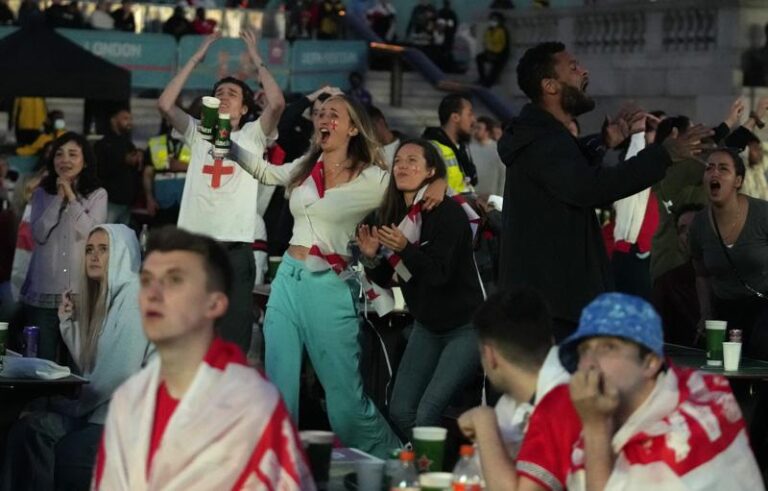
(AP) — Hannah Kumari has been an English soccer fan since childhood, but she never wanted to fly an England flag. Until now.
Kumari is one of millions of fans ecstatic that England’s men’s team has reached the final of a major tournament for the first time since it won the World Cup in 1966. But like many British people of color, she’s had an ambivalent relationship with symbols of Englishness.
Yet embracing them has come more easily thanks to the young, multi-ethnic squad that is on the cusp of triumph in the European Championships. After beating Denmark 2-1 in a semifinal on Wednesday that was watched by half the country’s population, England faces Italy in the final at London’s Wembley Stadium on Sunday.
“When I woke up this morning I thought, ‘I’m going to buy a St. George’s flag to hang out the window for Sunday,’” Kumari, who was born and raised in England to an Indian mother and Scottish father. said the day after the Denmark game.
“I’ve never owned an England shirt,” the actor-writer said.
“Something has definitely changed,” she said. “I feel almost like that team has given me permission to feel like I can wear an England shirt.”
The last few years have been hard on England and the rest of the United Kingdom. Britain’s exit from the European Union — a decision driven in part by a backlash against immigration left the country scratchy and divided. During the coronavirus pandemic, more than 128,000 people have died in the U.K., the highest toll in Western Europe.
Euro 2020 — the name is a year out of date due to the pandemic — has provided a much-needed jolt of excitement and fun. Millions weary of lockdowns and bad news are backing a team whose members speak out against racism, take a knee before games, support LGBT pride, campaign against poverty and, crucially, win games.
For decades, supporting England has been synonymous with dashed hopes. The lyrics of the country’s most popular soccer anthem, “Three Lions,” originally released in 1996, evokes England’s 1966 triumph and the long drought that followed: “Thirty years of hurt, never stopped me dreaming.”
Those 30 years have become 55, but once again England is dreaming.
The country’s hopes rest on a team very different from the all-white squad of 1966. A poster created by the Museum of Migration showed what the England team would look like if players without a parent or grandparent born abroad were excluded: Just three of the 11 starting players remained.
Missing were stars who included team captain Harry Kane, whose father is Irish; Marcus Rashford, whose mother is from Saint Kitts; Jamaica-born Raheem Sterling; and Buyako Saka, a Londoner with Nigerian parents.





